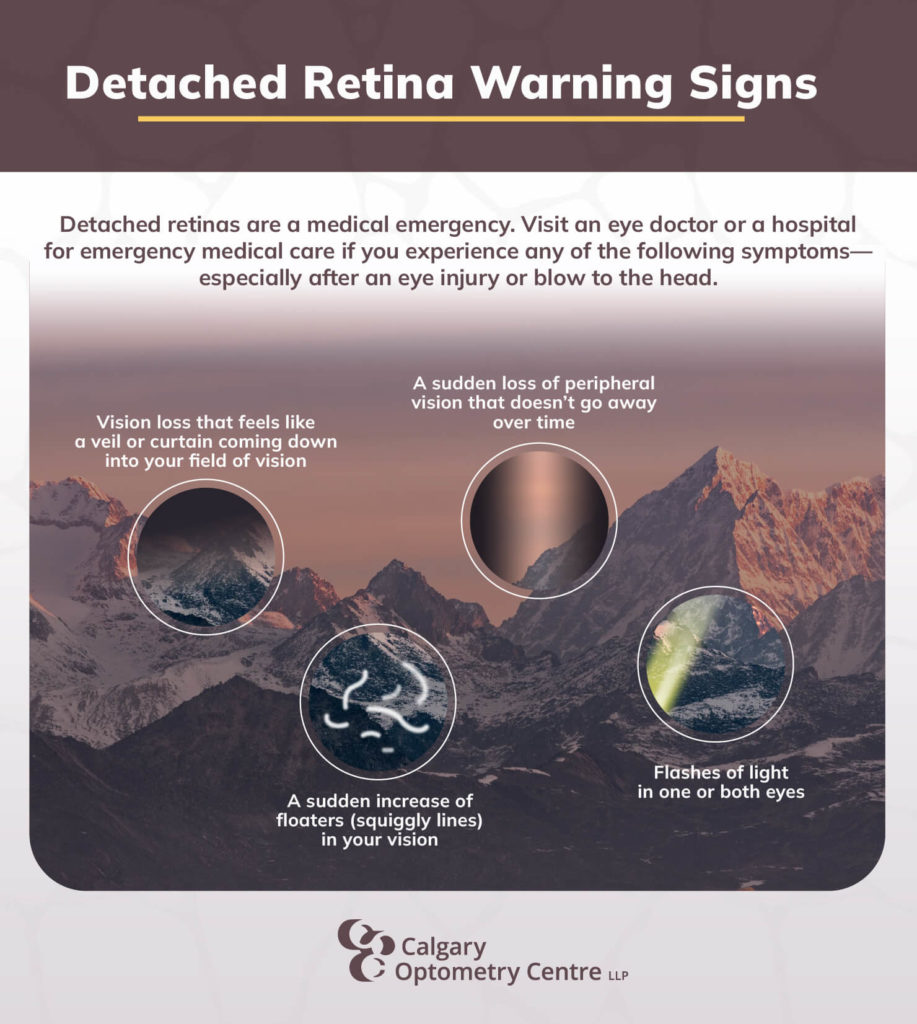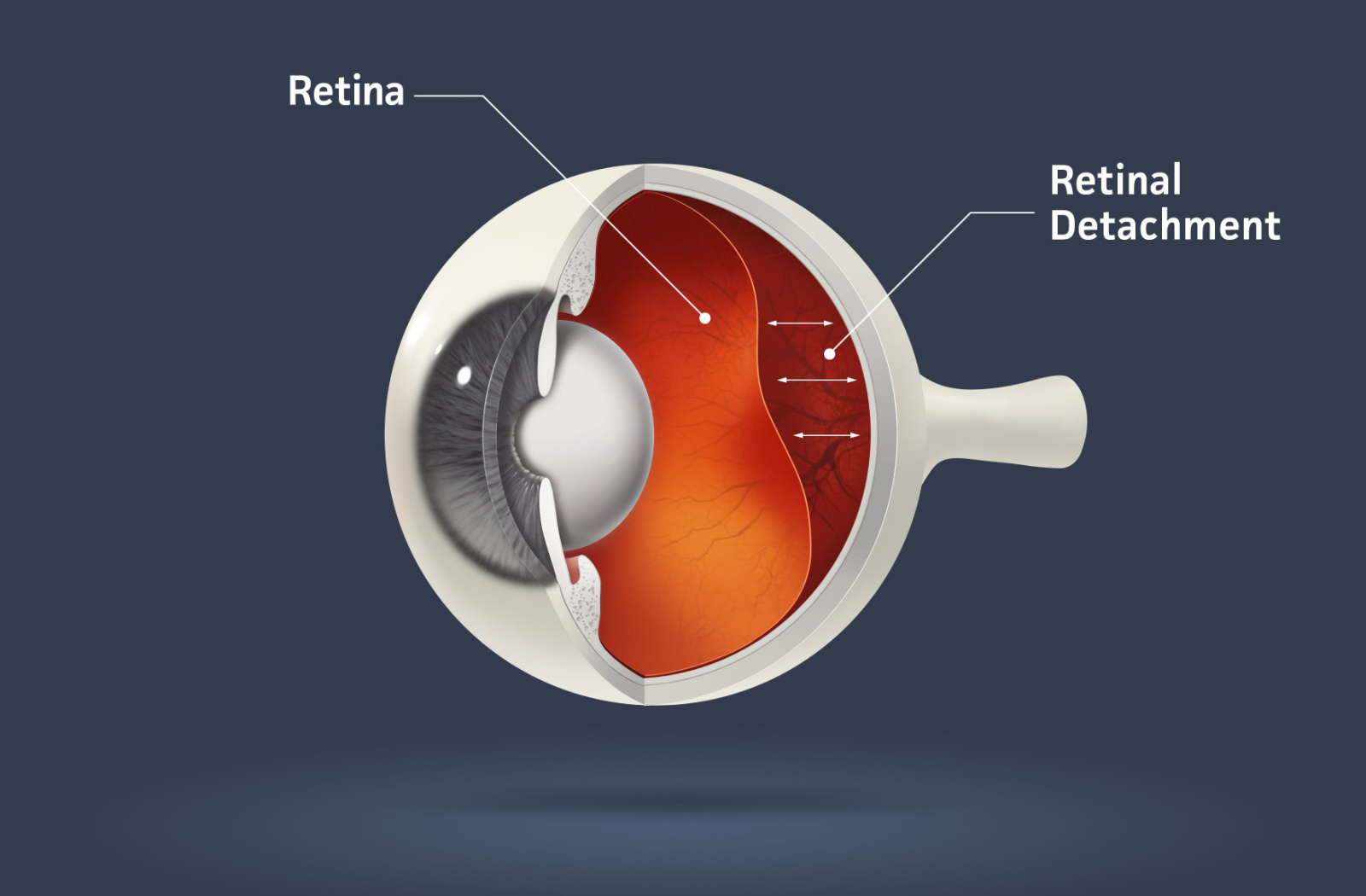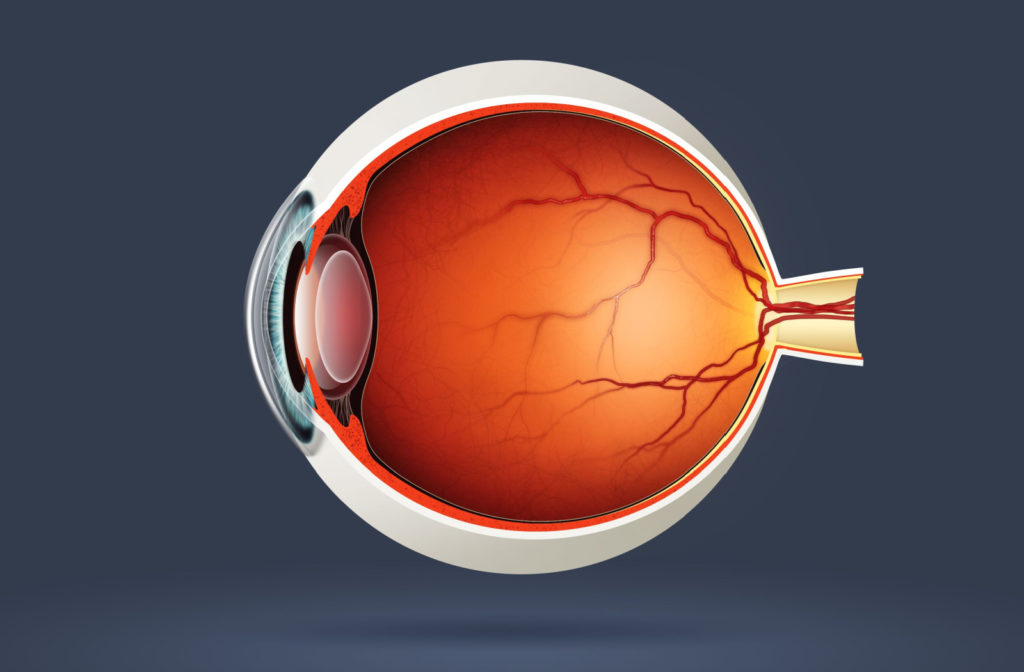Retinal detachment is considered a medical emergency. If you experience symptoms related to a detached retina or an eye emergency that can cause a detached retina, you should visit an optometrist or medical centre for emergency eye care.
An optometrist can detect signs of a detached retina and retinal tear by dilating your eyes and examining them with an ophthalmoscope or scanning them with optical coherence tomography (OCT) or ultrasound equipment.
A detached retina can cause permanent vision loss without prompt treatment, but with an early diagnosis and support from an eye care professional, you can preserve your vision.
What Are the Symptoms of a Detached Retina?
Common warning signs of a detached retina include:
- A sudden increase of floaters (squiggly lines) in your vision
- Flashes of light in one or both eyes
- Vision loss that looks like a veil or curtain coming down over your field of vision
- A sudden loss of peripheral vision that doesn’t go away over time
Seeing occasional flashes or floaters in your vision is generally considered normal—but if you experience sudden flashes of light or more floaters than usual, they could be a sign of a detached retina.
If you experience any of the symptoms above, don’t hesitate to contact your eye doctor. We can provide emergency eye care to help protect your vision and preserve your long-term eye health. If you notice unusual vision issues after an injury or trauma to the head or eyes, seeking prompt care could be critical for preventing vision loss.

What Causes Retinal Detachment?
There are 3 types of retinal detachment, each with its own distinct cause. But in general, retinal detachment occurs when your retina—the light-sensitive tissue at the back of your eye—is damaged or starts to pull away from the optic nerve because of changes to your eye health.
Some of the common underlying causes of retinal detachment include:
- Injuries to the eye
- Blows to the head
- Eye diseases
- Eye surgery complications
- Severe myopia
- Other health conditions, such as diabetes
What Causes Each Type of Retinal Detachment?
The 3 currently recognized types of retinal detachment are rhegmatogenous, tractional, and exudative retinal detachment.
Rhegmatogenous Retinal Detachment
Rhegmatogenous retinal detachment can be caused by a small tear or break in your retina and is the most common cause of retinal detachment. The issues that can cause a tear or break in your retina include the vitreous gel in your eye shrinking and pulling on your retina as you get older, as well as injuries or trauma to your eyes or head.
Tractional Retinal Detachment
Tractional retinal detachment can be caused by scar tissue on your retina pulling your retina away from the back of your eye. One of the most common causes of retinal scarring is diabetic retinopathy—a potential complication of diabetes that can cause vision loss and blindness.
Exudative Retinal Detachment
Exudative retinal detachment can be caused by fluid building up in the back of your eye that gets trapped behind your retina, causing it to push your retina away from the back of your eye.
Fluid buildup in your eye can be caused by leaking blood vessels or swelling related to:
- Eye injuries
- Age-related macular degeneration (AMD)
- Tumours in your eye
- Inflammation in your eye
- Coats disease, a rare eye condition

What Can Increase Your Risk of Retinal Detachment?
Your personal eye health, family medical history, and overall health are all factors that can affect your risk of retinal detachment. Eye injuries and head injuries can also increase your risk of a detached retina.
Some of the specific conditions and situations that can increase your risk of retinal detachment include:
- A family medical history of retinal detachment
- Serious eye injuries
- Previous eye surgeries, such as cataract surgery
- Thinning of the retina
- Diabetes and diabetic retinopathy
- Severe (myopia)
It’s possible to experience retinal detachment years after sustaining an eye injury or blow to the head, so prompt emergency medical care and routine comprehensive eye exams are essential for monitoring and maintaining your eye health.
How Is a Detached Retina Treated?
Surgery is the only option for repairing or reattaching a damaged retina. If you only have a small hole or tear in your retina, it may be possible to seal it with a freezing probe or laser.
In severe cases of retinal detachment, it may be necessary to reattach your retina with other surgical procedures.
Can You Prevent Retinal Detachment?
It’s not always possible to prevent retinal detachment related to aging, but you can take steps to prevent other causes.
Wearing head and eye protection during situations where you may experience a head or eye injury is critical for protecting yourself. If you have diabetes, you can also reduce your risk of retinal detachment by making lifestyle changes that help manage and mitigate the effects of this condition.
Speak with an Eye Doctor about Retinal Detachment
At Calgary Optometry Centre, we’re committed to providing comprehensive eye care using modern diagnostic techniques and treatment technology. We can speak with you about the risks of retinal detachment, examine your eyes for other eye conditions, and help you maintain your long-term eye health.
Book an appointment with us today to learn more about your unique eyes and what you can do to protect them.




